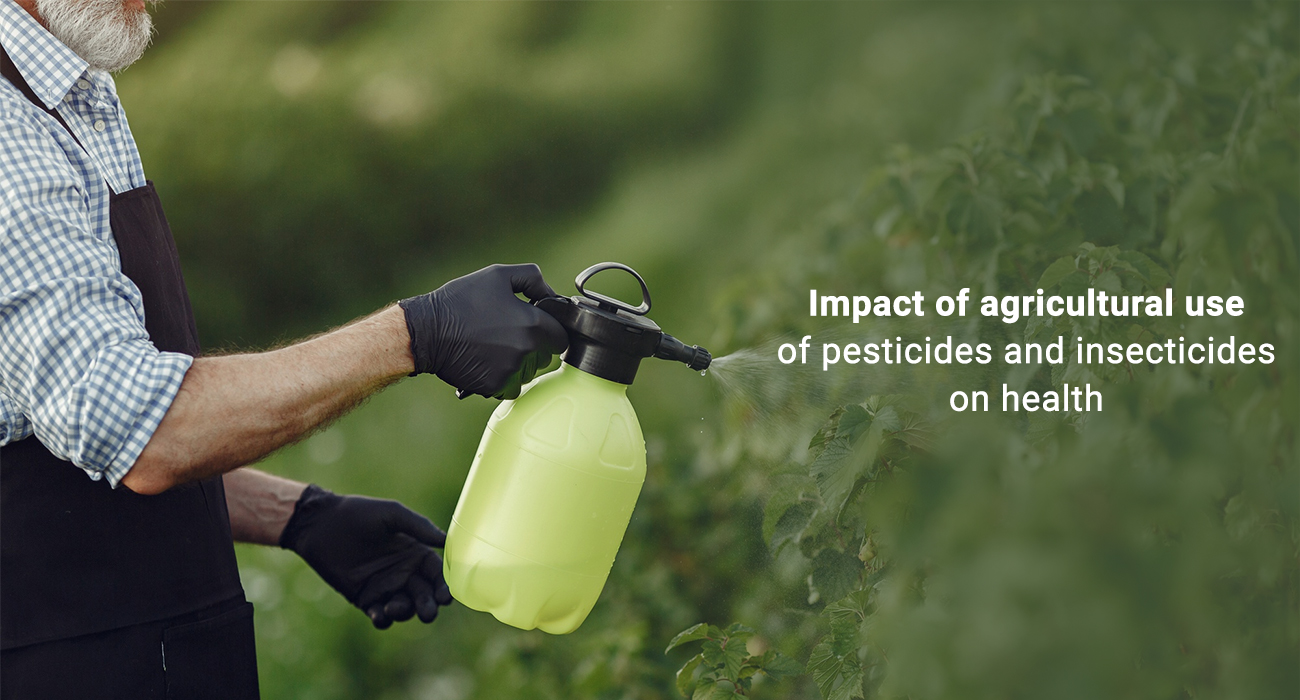Impact of agricultural use of Pesticides and Insecticides on health
11/16/2022
Pesticides are basically chemical substance that is used to kill and control certain types of plant or animal life that are considered pests. This pest harms or destroys vegetation; pests can be of various types such as weeds, unwanted vegetation insects, fungicides, growth of molds, bacteria, rats, mice, etc. Whereas insecticides are types of pesticides that are created to kill, harm, or mitigate one or more types of species so that they do not destroy the vegetation. The insecticide works in various different ways as some may disturb the nervous system of the insect while others may damage its exoskeleton.
The use of pesticides and insecticides may help farmers with their vegetation but it impacts the environment and the health of individuals. Pesticides usually cause short-term adverse health effects that may cause serious chronic diseases if the exposure is prolonged and persistent. Prolonged exposure to pesticides and insecticide make causes several health-related conditions such as:
- Rashes
- Blindness
- Nausea
- Dizziness
- Vomiting
- Blisters
- Diarrhea
- Birth defects
- Asthma
- Hormonal changes
- Heart problems
- Digestive issues
- Cancer
- Neurotoxicity
- Developmental toxicity
- Death
- Disruptive endocrine system
- Infertility
- Thyroid issues
- Liver damage
- Kidney damage
It is seen that children are more vulnerable to exposure to pesticides and insecticides as their bodies are delicate. It usually affects the organs, the immune system, and the nervous system of children as it is still in the development stage and they haven't attained a fully grown immune system that can protect them from toxicity and harmful chemicals of pesticides. Further, it affects the children's psychology, physiology, and behavior when they are exposed to pesticides for a longer duration of time. Furthermore, prolonged exposure to pesticides has also been linked to certain diseases such as
- Cancer
- Diabetes
- Alzheimer
- Parkinson's disease
- Amyotrophic lateral sclerosis
- Infertility
- Birth defects
- Bronchitis
- Autism
- Obesity
- Respiratory disease
- Organ disease
- Deficit hyperactivity disorder
- System failure
Also, individuals who are likely to be exposed to pesticides are at the greatest risk of developing non-Hodgkin lymphoma, brain tumor, and different types of cancer such as liver, stomach, colorectal, prostate, breast, lungs, urinary bladder, etc.
Pesticides that cause harm to health and the environment
Soil Fumigants: These kinds of pesticides are added to the soil which forms a gas that is toxic to fungi insects, plants, and nematodes present in the soil. Some commonly used soil fumigants include:
-Dichloropropene
-Metam sodium
-Chloropicrin
-Metam potassium
-Metam sodium
-1-3,dichloropropene
Pyrethroids: This type of insecticide is made from synthetic Chemicals that are usually structurally similar to Botanical compounds designed to be more efficient. But these compounds are toxic to the nervous system and have a negative impact on the pregnancy. The chemical also causes poisoning that has symptoms such as headache, fatigue, vomiting, stinging, itching skin, tremors, salivation, and involuntary twitching.
Organophosphates and Carbamates: These attack the nervous system and brain to an extent that it interfaces the nerve signal transmission. This also poses several health threats and shows symptoms such as nausea, dizziness, vomiting, headache, diarrhea, muscle pain, confusion, etc.

